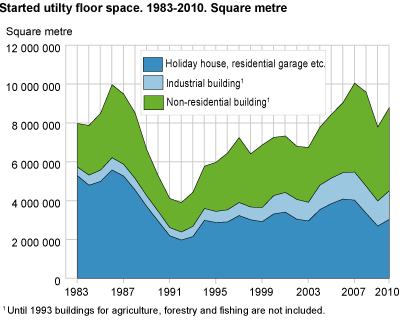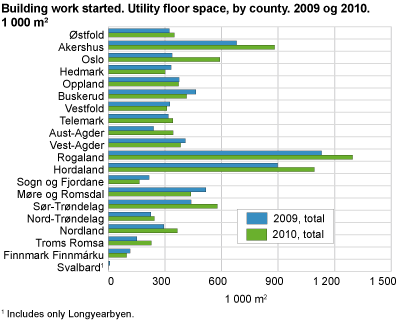Content
Published:
This is an archived release.
Highest increase in largest cities
In 2010 building starts were given for 3 059 000 square metres of utility floors space for dwellings, and 5 727 000 square metres for other than dwellings. This is an increase of 11 and 14 per cent respectively from 2009. It is the most populated municipalities that have experienced the largest increase in building activity.
Largest municipalities ensure increase in industrial sector
In 2010 building starts were given for 5 727 000 square metres for other than dwellings. This is an increase of 684 000 square metres from the year before. It is especially the most populated municipalities that have experienced the largest increase in building starts in the industrial sector. In the municipalities of Bergen, Oslo and Trondheim, building starts were given on 259 000 square metres for other than dwellings.
A total of 214 of Norway’s 430 municipalities have however experienced no change or a decrease in building activity in the industrial sector.
Large increase in multi-dwellings and student homes
In 2010 building starts were given for 21 145 dwellings. This is 1 397 more dwellings than the year before. It is especially building starts of dwellings in multi-dwelling buildings and student homes that stand for this increase. The number of building starts for dwellings in multi-dwelling buildings went up by 1 853 dwellings, compared with the year before, and the number of dwellings in student homes increased correspondingly by 752 dwellings.
The number of building starts for dwellings in detached houses did however decrease by 1 484 dwellings. In 253 municipalities there was no increase in building starts for dwellings.
Registered building permissionsFigures for buildings in the building statistics rely on dates for when permits are registered by the municipality in the data register (Matrikkelen). A building permit does not always mean that construction will be started at once. Especially in low conjunctures it might be that construction projects are not realised, or may be postponed after a building permit has been granted. When the building activity trend turns from a low to a high level, and vice versa, this could affect the interpretation of the statistics.
More about comparability, quality and other information in "About the statistics" . Lack in registrationBuildings registered without the need for application, after the introduction of the data register Matrikkelen, have to varying degrees been registered with all necessary information. This in turn has led to an underestimation of buildings in the agricultural sector in particular. A total of 8 500 buildings have been registered as notifiable matters without information on utility floor space.
In this release new figures are published for 2008 and 2009. |
More figures are available in Statbank . |
Tables:
- Table 1 Building work started. Dwellings and utility floor space, by type of building. 2010
- Table 2 Buildings completed. Dwellings and utility floor space, by type of building. 2010
- Table 3 Building work started. Dwellings and utility floor space in dwellings, by type of building and county. 2010
- Table 4 Building work started. Utility floor space, by type of building and county. 1 000 m 2 . 2010
- Table 5 Building work started. Utility floor space other than in dwellings, by user's industry and county. 1 000 m 2 . 2010
- Table 6 Building work started and buildings completed. Dwellings and utility floor space in dwellings. Utility floor space other than in dwellings. Municipality. 2010
Contact
-
Jens Mathiesen
E-mail: jens.mathiesen@ssb.no
tel.: (+47) 40 81 13 98
-
Magnus Espeland
E-mail: magnus.espeland@ssb.no
tel.: (+47) 45 27 40 08


